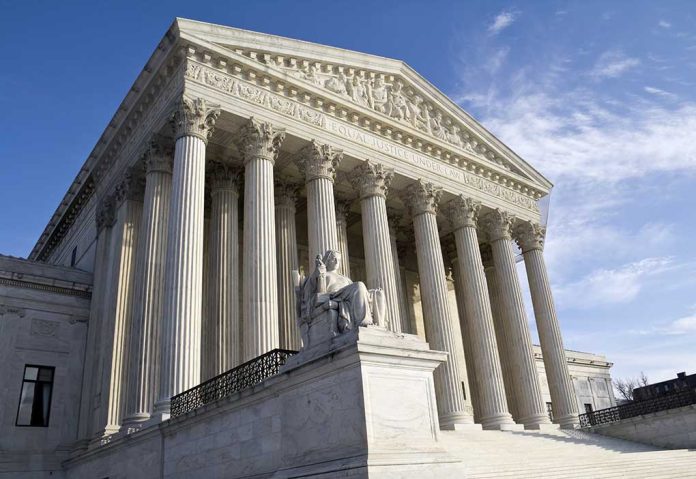
The U.S. Supreme Court has declined to hear a case challenging the legal status of IVF embryos in Alabama, leaving uncertainty for fertility clinics and potential parents.
At a Glance
- U.S. Supreme Court refused to review Alabama’s ruling classifying frozen embryos as minor children
- Alabama’s decision led to temporary halts in IVF services and widespread criticism
- Alabama Legislature passed a bill granting clinics immunity in providing IVF treatments
- The case originated from a lawsuit claiming negligence in the destruction of embryos
- A court hearing is scheduled for November 8 in the Circuit Court of Mobile County
Supreme Court Declines to Intervene in Alabama IVF Case
The United States Supreme Court has chosen not to hear an appeal concerning the legal status of in vitro fertilization (IVF) embryos in Alabama. This decision comes after a controversial ruling by the Alabama Supreme Court that classified frozen embryos as minor children under an 1872 law. The high court’s refusal to intervene leaves in place a decision that has sparked national debate and raised concerns about the future of fertility treatments.
The Alabama ruling, which allowed couples to sue for wrongful death over the accidental destruction of frozen embryos, led to temporary halts in IVF services across the state. Several large fertility providers paused their operations, fearing potential legal repercussions. This decision was described as “shocking” by legal experts and contrary to other U.S. court rulings on similar issues.
Legal Challenges and Legislative Response
The case that sparked this controversy originated from a lawsuit filed by Felicia and Scott Aysenne, who claimed negligence led to the destruction of their embryos at a fertility clinic. The Alabama Supreme Court’s decision to allow the parents to seek civil damages under the 1872 law sent shockwaves through the medical community and raised alarms about the potential criminalization of routine IVF procedures.
In response to the widespread concerns and criticism, the Alabama Legislature swiftly passed a bill in March granting clinics immunity in providing IVF treatments. This legislative action allowed providers to resume services, offering some reassurance to couples seeking fertility treatments. However, the underlying legal questions remain unresolved at the federal level.
SCOTUS declined to review *the* Alabama decision that ruled frozen embryos created from IVF “are children” and temporarily restricted access to IVF in AL earlier this year
The case caused concern around how abortion bans could impact fertility treatmentshttps://t.co/rxYs21dKei
— Oriana González (@OrianaBeLike) October 7, 2024
Implications and Ongoing Legal Battle
The Center for Reproductive Medicine and Mobile Infirmary Medical Center had petitioned the U.S. Supreme Court to review the Alabama decision, arguing that it violated their 14th Amendment due process rights and failed to address the plaintiffs’ legal standing. The clinics contended that the ruling disrupts longstanding legal interpretations and threatens reproductive services across the country.
Despite the Supreme Court’s decision not to hear the case, the legal battle is far from over. A court hearing is scheduled for November 8 in the Circuit Court of Mobile County, where the ongoing wrongful death lawsuit will be addressed. This case continues to raise important questions about the legal status of embryos and the potential ramifications for fertility treatments nationwide.
The controversy surrounding this case highlights the complex intersection of medical science, ethics, and law. As technology advances and societal views on reproduction evolve, courts and legislatures will likely face more challenges in balancing the rights of potential parents, the ethical considerations of embryo status, and the practical realities of fertility treatments.














